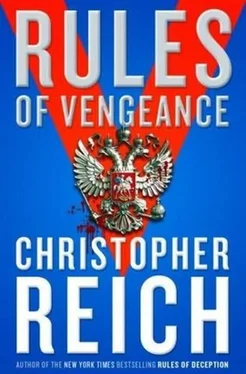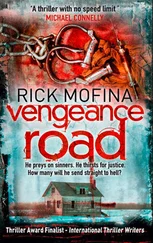Emma grabbed her laptop from the desk and set it on the bed. Accessing the CD that Pierre Bertels of the International Nuclear Safety Corporation had provided earlier, she quickly located the address of M. Jean Grégoire, chief of security of La Reine. Navigating to Google maps, she entered the address 12 Rue Saint-Martin, Bredonchel, France. A picture of lush green countryside appeared. She zoomed down to an altitude of 100 meters. Though the image was blurred, she could tell that the home was a typical Normandy farmhouse, with a slate roof, two chimneys, and a clay bocce court in the back. She switched to street view and was granted a crystal-clear snapshot of the home taken from the front drive.
She returned to satellite view and noted that there were no other homes within 200 meters of 12 Rue Saint-Martin. This pleased her. Two hundred meters was officially defined as “shouting distance.”
Emma changed into jeans and a T-shirt and washed up. Before going downstairs, she put a scarf around her hair and donned a pair of wraparound sunglasses. On the way to the door, she picked up her camera and attached the telephoto lens. The clerk at the front desk didn’t give her a second look as she left.
The drive to the Rue Saint-Martin took twenty minutes. Signs pointed to historical names like Bayeux and Caen, and more than once she passed small, immaculate cemeteries with hundreds of white gravestones, each with an American flag at its base. She knew little about these places or the battles that had raged on these fields. Her knowledge of the Second World War was centered on cities with names like Stalin-grad, Leningrad, and Kaliningrad.
Nowhere were road names or street designations posted. She relied on the car’s built-in navigation system to guide her. Reaching the fork for Rue Saint-Martin, she slowed to 30 kilometers per hour and rolled down both windows. There was only one house on the road. It was the house she had seen on the computer. The front door had been repainted, but otherwise it appeared identical. As she passed, she raised her camera and fired off a dozen pictures in rapid succession. She continued another kilometer before turning around and driving back the way she had come. Surely she wasn’t the first tourist to become lost along these unmarked lanes.
She drove faster this time. As she approached she observed activity in front of the house. A girl with red hair jumped off her bicycle and dumped it on the lawn as she ran toward the front door. A blond boy, no more than three, followed her, shouting excitedly.
Emma did not slow. She kept her eyes ahead, even as her throat tightened. She had not known there would be children. A voice reminded her who she was and why she was there. It was Papi’s voice, and it put steel into her heart.
Two additional subjects, she noted with a measure of dispassion that would do Papi proud.
She would need four pairs of flexicuffs.
Night was falling and the coastal air remained warm and scented with pine and jasmine. Jonathan slid down the hillside, spraying dirt and rubble, taking refuge behind an outcropping of rocks and boulders. Below him the medieval town of Èze clung to the mountainside, a collage of clay tile roofs and rustic masonry. A steeple breached its midst like an upturned dagger. Farther down, running like a ribbon along the hillside, was the Moyenne Corniche, continuing toward Cap Ferrat and the bay of Villefranche. A church bell tolled nine o’clock.
Jonathan dropped his rucksack to the ground and dug inside it for a pair of binoculars. He’d purchased the item, along with a cell phone, water, and other necessities, at the Hypermarché store in Menton, courtesy of Luca Lazio’s credit card. Putting the binoculars to his eyes, he studied a villa perched on the opposing escarpment. It was small and old, fashioned from blocks of white stone, its chipped tile roof the same sun-bleached ocher as every other roof on the Côte d’Azur. Off to one side was a terrace surrounded by a metal railing. On the road below, a mailbox fronted the villa, with “58 Route de La Turbie ” painted in white lettering.
Something moved on the terrace. French doors stood open, when a moment ago they’d been closed. A shadow floated inside the house. A man or woman. Instinctively, Jonathan pressed himself against the rocks. He remained still, eyes trained on the sheers billowing from the open doors. An enormous tabby cat wandered outside and plopped down beneath a wrought-iron table. Several minutes passed, and there was no further sign of the figure.
Jonathan slipped the new cell phone from his pocket. A single number was programmed into its memory. He punched speed dial and brought the phone to his ear. The call went through and began to ring.
Just then the figure appeared on the terrace. A man, Jonathan’s age. Slim, medium height, with black hair and a complexion that begged for the sun. He was dressed in a dark suit and open-collared shirt. Both his clothes and his bearing were too formal for a summer’s eve on the French Riviera. He was on the job.
“Alió,” he answered. French spoken with a foreigner’s accent.
“Is this VOR S.A.?” responded Jonathan, also in French. “I’d like to speak to Serge Simenon.”
Jonathan had found VOR S.A. listed in an online registry of corporations domiciled in the Alpes-Maritimes. The name of its sole director was included, along with information stating that the company had been founded ten years earlier with a modest capital of one hundred thousand euros and that it maintained offices in Paris and Berlin. VOR S.A.’s principal business activity was listed as “international trade.” It was, he decided, a suitably amorphous term for spying.
“Who is calling?”
“My name is Jonathan Ransom. Mr. Simenon knows who I am.”
“Please hold the line.” The accent betrayed the soft t and jagged s of Central Europe. But where? Germany? Poland? Hungary? Still peering through the binoculars, Jonathan watched as the man put him on hold and called another number. He spoke a few words, then his voice was back. “Mr. Simenon says he does not know you.”
“Tell him that I’ve just come from Rome and that I know he paid Emma Ransom’s hospital bill.”
Silence.
“And tell him that I know exactly what Emma is planning to do,” Jonathan added, with a certain recklessness, like a man who’d tossed his last chip onto the table.
Another click as Jonathan was put on hold. More conversation as the man on the terrace began to pace, his posture stiffer than it had been a minute before. Then the voice: “May I ask where you are, Dr. Ransom?”
“I’m in Monaco. Meet me at the Café de Paris in fifteen minutes.
Place du Casino. I’ll be sitting at a table outside. I’m wearing jeans and a blue T-shirt.”
“No need. We know who you are.”
“Wait,” said Jonathan. “Who are you?”
“I am Alex.”
The call was terminated. Jonathan looked on as the pale, dark-haired man named Alex continued his conversation with Simenon. The exchange was brief, but even at this distance eventful. Several times Alex nodded his head with Pavlovian obedience. A man receiving his orders. He completed his call and put the phone away.
Transfixed, Jonathan observed him draw a pistol from the folds of his jacket, rack a round, then replace it. The man bent to pet the cat, then rose and disappeared inside.
A minute later, the door to a garage bay half hidden among the boulders and scrub 50 meters down the road from the villa opened. A white Peugeot coupe backed onto the road and roared down the hill.
Jonathan waited until the car was out of sight, then he waited two more minutes after that. Convinced that “Alex” intended to keep their appointment, he scrambled up the hillside and stuffed the rucksack and its contents into the motorcycle’s saddlebags, straddled the bike, and navigated the winding road to the villa. He parked up the road, just beyond a bend. He did not bother with the stairs. Instead he jogged to the wall fronting the terrace and nimbly climbed the protruding stones. Five minutes after he’d hung up the phone, he was standing on the villa’s terrace.
Читать дальше












